Jiaming Tang
LServe: Efficient Long-sequence LLM Serving with Unified Sparse Attention
Feb 20, 2025Abstract:Large language models (LLMs) have shown remarkable potential in processing long sequences, yet efficiently serving these long-context models remains challenging due to the quadratic computational complexity of attention in the prefilling stage and the large memory footprint of the KV cache in the decoding stage. To address these issues, we introduce LServe, an efficient system that accelerates long-sequence LLM serving via hybrid sparse attention. This method unifies different hardware-friendly, structured sparsity patterns for both prefilling and decoding attention into a single framework, where computations on less important tokens are skipped block-wise. LServe demonstrates the compatibility of static and dynamic sparsity in long-context LLM attention. This design enables multiplicative speedups by combining these optimizations. Specifically, we convert half of the attention heads to nearly free streaming heads in both the prefilling and decoding stages. Additionally, we find that only a constant number of KV pages is required to preserve long-context capabilities, irrespective of context length. We then design a hierarchical KV page selection policy that dynamically prunes KV pages based on query-centric similarity. On average, LServe accelerates LLM prefilling by up to 2.9x and decoding by 1.3-2.1x over vLLM, maintaining long-context accuracy. Code is released at https://github.com/mit-han-lab/omniserve.
Twilight: Adaptive Attention Sparsity with Hierarchical Top-$p$ Pruning
Feb 06, 2025



Abstract:Leveraging attention sparsity to accelerate long-context large language models (LLMs) has been a hot research topic. However, current algorithms such as sparse attention or key-value (KV) cache compression tend to use a fixed budget, which presents a significant challenge during deployment because it fails to account for the dynamic nature of real-world scenarios, where the optimal balance between accuracy and efficiency can vary greatly. In this paper, we find that borrowing top-$p$ sampling (nucleus sampling) to sparse attention can surprisingly achieve adaptive budgeting. Based on this, we propose Twilight, a framework to bring adaptive sparsity to any existing sparse attention algorithm without sacrificing their accuracy. Empirical results show that Twilight can adaptively prune at most 98% of redundant tokens, leading to $15.4\times$ acceleration in self-attention operations and $3.9\times$ acceleration in end-to-end per token latency in long context LLM decoding.
DuoAttention: Efficient Long-Context LLM Inference with Retrieval and Streaming Heads
Oct 14, 2024


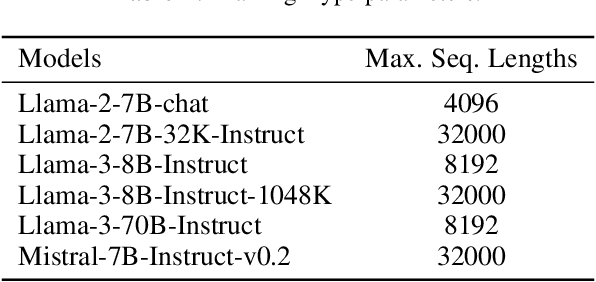
Abstract:Deploying long-context large language models (LLMs) is essential but poses significant computational and memory challenges. Caching all Key and Value (KV) states across all attention heads consumes substantial memory. Existing KV cache pruning methods either damage the long-context capabilities of LLMs or offer only limited efficiency improvements. In this paper, we identify that only a fraction of attention heads, a.k.a, Retrieval Heads, are critical for processing long contexts and require full attention across all tokens. In contrast, all other heads, which primarily focus on recent tokens and attention sinks--referred to as Streaming Heads--do not require full attention. Based on this insight, we introduce DuoAttention, a framework that only applies a full KV cache to retrieval heads while using a light-weight, constant-length KV cache for streaming heads, which reduces both LLM's decoding and pre-filling memory and latency without compromising its long-context abilities. DuoAttention uses a lightweight, optimization-based algorithm with synthetic data to identify retrieval heads accurately. Our method significantly reduces long-context inference memory by up to 2.55x for MHA and 1.67x for GQA models while speeding up decoding by up to 2.18x and 1.50x and accelerating pre-filling by up to 1.73x and 1.63x for MHA and GQA models, respectively, with minimal accuracy loss compared to full attention. Notably, combined with quantization, DuoAttention enables Llama-3-8B decoding with 3.3 million context length on a single A100 GPU. Code is provided in https://github.com/mit-han-lab/duo-attention.
Quest: Query-Aware Sparsity for Efficient Long-Context LLM Inference
Jun 16, 2024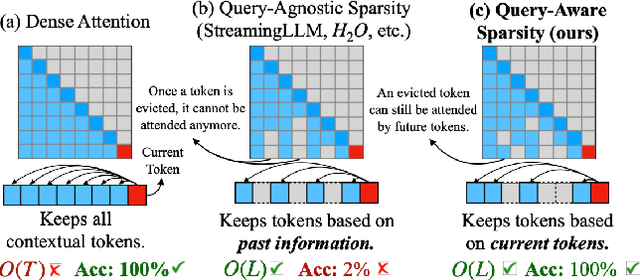
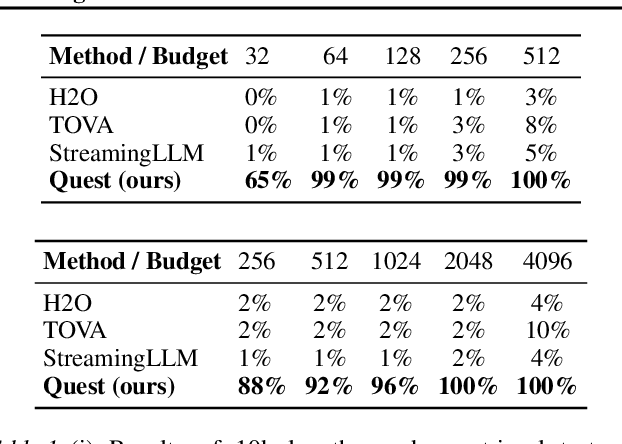
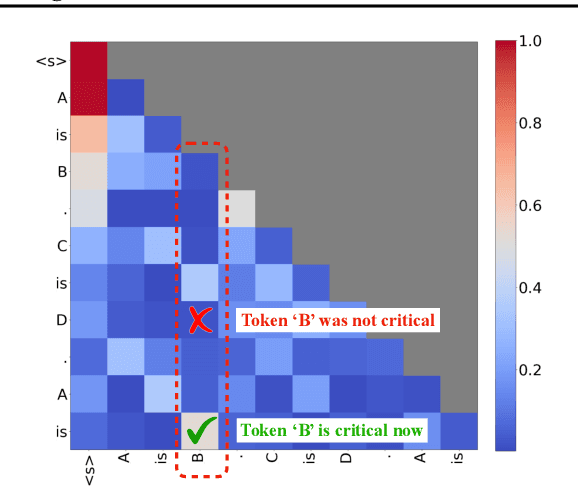
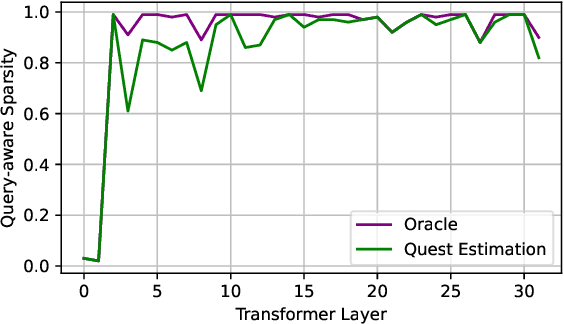
Abstract:As the demand for long-context large language models (LLMs) increases, models with context windows of up to 128K or 1M tokens are becoming increasingly prevalent. However, long-context LLM inference is challenging since the inference speed decreases significantly as the sequence length grows. This slowdown is primarily caused by loading a large KV cache during self-attention. Previous works have shown that a small portion of critical tokens will dominate the attention outcomes. However, we observe the criticality of a token highly depends on the query. To this end, we propose Quest, a query-aware KV cache selection algorithm. Quest keeps track of the minimal and maximal Key values in KV cache pages and estimates the criticality of a given page using Query vectors. By only loading the Top-K critical KV cache pages for attention, Quest significantly speeds up self-attention without sacrificing accuracy. We show that Quest can achieve up to 2.23x self-attention speedup, which reduces inference latency by 7.03x while performing well on tasks with long dependencies with negligible accuracy loss. Code is available at http://github.com/mit-han-lab/Quest .
DCRMTA: Unbiased Causal Representation for Multi-touch Attribution
Feb 05, 2024Abstract:Multi-touch attribution (MTA) currently plays a pivotal role in achieving a fair estimation of the contributions of each advertising touchpoint to-wards conversion behavior, deeply influencing budget allocation and advertising recommenda-tion. Previous works attempted to eliminate the bias caused by user preferences to achieve the unbiased assumption of the conversion model. The multi-model collaboration method is not ef-ficient, and the complete elimination of user in-fluence also eliminates the causal effect of user features on conversion, resulting in limited per-formance of the conversion model. This paper re-defines the causal effect of user features on con-versions and proposes a novel end-to-end ap-proach, Deep Causal Representation for MTA (DCRMTA). Our model focuses on extracting causa features between conversions and users while eliminating confounding variables. Fur-thermore, extensive experiments demonstrate DCRMTA's superior performance in converting prediction across varying data distributions, while also effectively attributing value across dif-ferent advertising channels.
AWQ: Activation-aware Weight Quantization for LLM Compression and Acceleration
Jun 01, 2023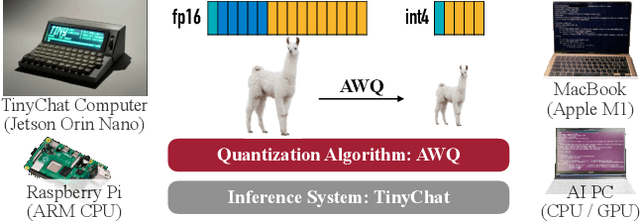


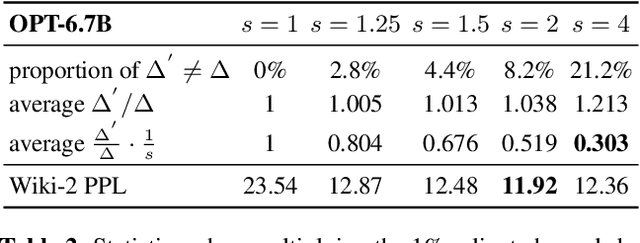
Abstract:Large language models (LLMs) have shown excellent performance on various tasks, but the astronomical model size raises the hardware barrier for serving (memory size) and slows down token generation (memory bandwidth). In this paper, we propose Activation-aware Weight Quantization (AWQ), a hardware-friendly approach for LLM low-bit weight-only quantization. Our method is based on the observation that weights are not equally important: protecting only 1% of salient weights can greatly reduce quantization error. We then propose to search for the optimal per-channel scaling that protects the salient weights by observing the activation, not weights. AWQ does not rely on any backpropagation or reconstruction, so it can well preserve LLMs' generalization ability on different domains and modalities, without overfitting to the calibration set; it also does not rely on any data layout reordering, maintaining the hardware efficiency. AWQ outperforms existing work on various language modeling, common sense QA, and domain-specific benchmarks. Thanks to better generalization, it achieves excellent quantization performance for instruction-tuned LMs and, for the first time, multi-modal LMs. We also implement efficient tensor core kernels with reorder-free online dequantization to accelerate AWQ, achieving a 1.45x speedup over GPTQ and is 1.85x faster than the cuBLAS FP16 implementation. Our method provides a turn-key solution to compress LLMs to 3/4 bits for efficient deployment.
 Add to Chrome
Add to Chrome Add to Firefox
Add to Firefox Add to Edge
Add to Edge